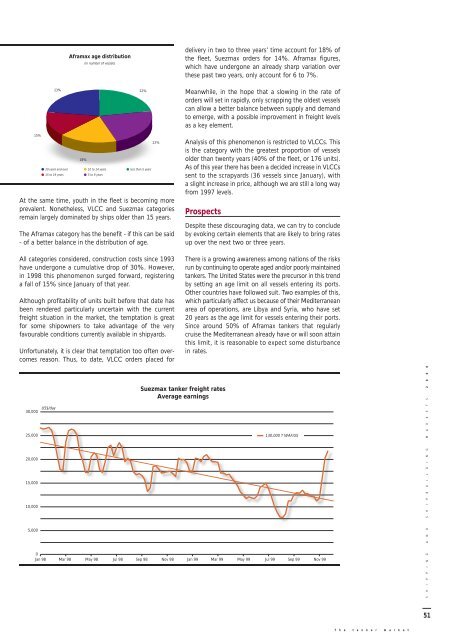You also want an ePaper? Increase the reach of your titles
YUMPU automatically turns print PDFs into web optimized ePapers that Google loves.
15%<br />
At the same time, youth in the fleet is becoming more<br />
prevalent. Nonetheless, VLCC and Suezmax categories<br />
remain largely dominated by ships older than 15 years.<br />
The Aframax category has the benefit - if this can be said<br />
- of a better balance in the distribution of age.<br />
All categories considered, construction costs since 1993<br />
have undergone a cumulative drop of 30%. However,<br />
in 1998 this phenomenon surged forward, registering<br />
a fall of 15% since January of that year.<br />
Although profitability of units built before that date has<br />
been rendered particularly uncertain with the current<br />
freight situation in the market, the temptation is great<br />
for some shipowners <strong>to</strong> take advantage of the very<br />
favourable conditions currently available in <strong>shipyards</strong>.<br />
Unfortunately, it is clear that temptation <strong>to</strong>o often overcomes<br />
reason. Thus, <strong>to</strong> date, VLCC <strong>orders</strong> placed for<br />
30,000<br />
25,000<br />
20,000<br />
15,000<br />
10,000<br />
5,000<br />
23%<br />
20 years and over<br />
15 <strong>to</strong> 19 years<br />
US$/day<br />
Aframax age distribution<br />
18%<br />
(in number of vessels)<br />
10 <strong>to</strong> 14 years<br />
5 <strong>to</strong> 9 years<br />
22%<br />
less than 5 years<br />
22%<br />
delivery in two <strong>to</strong> three years’ time account for 18% of<br />
the fleet, Suezmax <strong>orders</strong> for 14%. Aframax figures,<br />
which have undergone an already sharp variation over<br />
these past two years, only account for 6 <strong>to</strong> 7%.<br />
Meanwhile, in the hope that a slowing in the rate of<br />
<strong>orders</strong> will set in rapidly, only scrapping the oldest vessels<br />
can allow a better balance between supply and demand<br />
<strong>to</strong> emerge, with a possible improvement in freight levels<br />
as a key element.<br />
Analysis of this phenomenon is restricted <strong>to</strong> VLCCs. This<br />
is the category with the greatest proportion of vessels<br />
older than twenty years (40% of the fleet, or 176 units).<br />
As of this year there has been a decided increase in VLCCs<br />
sent <strong>to</strong> the scrapyards (36 vessels since January), with<br />
a slight increase in price, although we are still a long way<br />
from 1997 levels.<br />
Prospects<br />
Suezmax tanker freight rates<br />
Average earnings<br />
Despite these discouraging data, we can try <strong>to</strong> conclude<br />
by evoking certain elements that are likely <strong>to</strong> bring rates<br />
up over the next two or three years.<br />
There is a growing awareness among nations of the risks<br />
run by continuing <strong>to</strong> operate aged and/or poorly maintained<br />
tankers. The United States were the precursor in this trend<br />
by setting an age limit on all vessels entering its ports.<br />
Other countries have followed suit. Two examples of this,<br />
which particularly affect us because of their Mediterranean<br />
area of operations, are Libya and Syria, who have set<br />
20 years as the age limit for vessels entering their ports.<br />
Since around 50% of Aframax tankers that regularly<br />
cruise the Mediterranean already have or will soon attain<br />
this limit, it is reasonable <strong>to</strong> expect some disturbance<br />
in rates.<br />
130,000 T WAF/US<br />
0<br />
Jan 98 Mar 98 May 98 Jul 98 Sep 98 Nov 98 Jan 99 Mar 99 May 99 Jul 99 Sep 99 Nov 99<br />
T h e t a n k e r m a r k e t<br />
S H I P P I N G A N D S H I P B U I L D I N G M A R K E T S 2 0 0 0<br />
51


